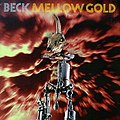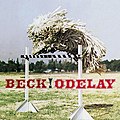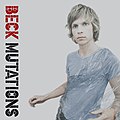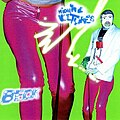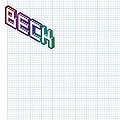Beck
Beck |
|---|
Beck Hansen (born Bek David Campbell, July 8, 1970) is an American musician, songwriter, and multi-instrumentalist, known by his simple stage name of Beck. With his pop collage of musical styles, oblique, ironic lyrics, and post-modern arrangements incorporating samples, drum machines, live instrumentation and sound effects, Beck was hailed by critics and the public as among the most idiosyncratic artists of 1990s alternative rock.[1] Beck rose from underground popularity following the "junk culture" zeitgeist of grunge (one early Beck song was called "MTV Makes Me Wanna Smoke Crack"). Indeed, many labeled his breakthrough single "Loser", a hit in 1994, as a novelty.
However, Beck was not easily categorized into a single genre. Some likened his absurdist, free-flowing lyrical style and the lo-fi folk songs of his early career to Bob Dylan, while the Beastie Boys were notable templates for his embrace of hip hop influences, and his later eclecticism sparked comparisons with Prince.[1] In several albums beginning in the late 1990s, Beck developed a slower, more melancholy sound, merging his trademark style with psychedelic rock, electronica, Brazilian Tropicalia, and the music of English folk icon Nick Drake and French avant pop star Serge Gainsbourg. To most listeners, Odelay (1996) and Sea Change (2002), Beck's most popular and acclaimed albums, represented polar opposites in style. Despite his individualism, Beck's music has been seen as very much a product of the 1990s and the media age in general, with a notable touchstone in recent years being his open embrace of Scientology.
Background
Beck was born in Los Angeles, California to David Campbell, a Canadian musician, and Bibbe Hansen, a visual artist. His paternal grandfather was a Presbyterian minister, while his maternal great-grandmother was Jewish; Beck says he was raised partially in the Jewish religion, although both of his parents are Scientologists.[2] [3] Beck's mother also has Norwegian and Swedish ancestry. When his parents separated, Beck stayed with his mother and brother in Los Angeles, where he was influenced by that city's diverse musical offerings—everything from hip hop to Latin music and his mother's art scene—all of which would later reappear in his recorded and published work.
After dropping out of high school in the mid-1980s, Beck educated himself and traveled widely. During this period he learned and developed his talent through the art of busking. In Germany, he spent time with his maternal grandfather, Fluxus artist Al Hansen. The late-1980s found him in New York City as part of the punk-influenced anti-folk music movement.
Recording career
(1988–1993) Independent releases
In 1988, Beck recorded a cassette entitled Banjo Story, which has since become available in bootleg form.[4]
Beck returned to Los Angeles at the turn of the decade, destitute but motivated. To support himself, he took a variety of low-paying, dead-end jobs, and even lived in a shed, all the while continuing to develop his music. During this time, Beck sought out (or snuck onto) stages at venues all over Los Angeles, from punk clubs to coffee shops and busking on the streets. This is also when he met Chris Ballew (founder of The Presidents of the United States of America) and they even performed on the streets as a duo for a while. In the spirit of an artist struggling to make a name for himself, his shows were memorable for their mix of humor and eccentricity. Some of his earliest and most thought-provoking recordings were achieved by working with Tom Grimley at Poop Alley Studios, a part of WIN Records.
In this atmosphere of heady creativity the founders of Bong Load Custom Records, Tom Rothrock, Rob Schnapf and Bradshaw Lambert discovered Beck, signing him to their fledgling label. "Loser", a collaboration between hip hop nuance producer Carl Stephenson and Beck, created a sensation on alternative radio stations like KXLU that led to a furious bidding war between labels to sign Beck. Eventually, he chose Geffen Records, who offered him terms that included an allowance for the release of independent albums while under contract. It is also notable that of all the record labels to offer Beck a contract, Geffen offered him the least amount of money, but the greatest amount of creative freedom.
(1994–1997) Mellow Gold and Odelay
In 1994, Geffen's official debut release of Mellow Gold, culled from sessions with Rothrock, Schnapf, and Stephenson, made Beck a mainstream smash success; it also led to his iconic status as the "slacker" representative of the alternative rock scene.
At the same time, he released Stereopathetic Soulmanure on Flipside Records and One Foot in the Grave on independent K Records. Beck took his act on the road in 1994 with a worldwide tour, followed by a spot on the main stage of the 1995 Lollapalooza tour. Still, some critics panned him as a one-hit wonder. Audiences' (especially at Lollapalooza) familiarity with "Loser," and their general disinterest in his other work only reinforced his image as such. When the time came to record his follow-up to Mellow Gold, he enlisted Rothrock and Schnapf as producers and began recording an album of moody, low-key acoustic numbers to showcase his songwriting. The songs were melancholy due to several close deaths in Beck's life, including one of his greatest inspirations, his grandfather. Eventually, having an instinctive change of heart, Beck shelved the album and pursued a more upbeat approach. Beck was introduced to the Dust Brothers, producers of the Beastie Boys' album Paul's Boutique, whose cut-and-paste, sample-heavy production suited Beck's vision of a more fun, accessible album.
What resulted, 1996's Odelay, would finally put the one-hit wonder label to rest. The lead single, "Where It's At," received heavy airplay, and its video was in constant rotation on MTV. Within the year, Odelay had received perfect reviews in Rolling Stone and Spin magazines, having been listed on countless "Best of" lists (it topped the Pazz & Jop Critics Poll for 'Album of the Year'), receiving double-platinum status, and earning an impressive number of industry awards, including two Grammys.
(1998–2001) Mutations and Midnite Vultures
Odelay was followed in 1998 by Mutations. Though the album was originally supposed to be released on Bong Load Records, Geffen intervened and issued the record against Beck's wishes.[5] [6] The artist then sought to void his contracts with both record labels, and in turn the labels sued him for breach of contract. The litigation went on for years and remains unclear to this day if it was ever completely resolved. [2] Produced by Nigel Godrich of Radiohead fame, it was intended as a stopgap measure before the next album proper. Recorded over two weeks, during which Beck recorded one song a day, the sessions produced fourteen songs. Mutations was a departure from the electronic density of Odelay, and was filled with folk and blues influences. Songs on the album consisted of older tracks, some even dating back as far as 1994. Track 10, "Sing It Again", was written for Johnny Cash, but Beck never submitted it, considering it "rubbish." Cash would go on to record "Rowboat," a song that originally appeared on Beck's Stereopathetic Soulmanure.
During 1998, Beck's art collaborations with his grandfather Al Hansen were featured in an exhibition entitled 'Beck & Al Hansen: Playing With Matches' and showcased solo and collaborative collage, assemblage, drawing and poetry works. The show toured from the Santa Monica Museum of Art to galleries in New York City and Winnipeg, Canada. A catalogue of the show was published by Plug In Editions/Smart Art Press.
In 1999, Geffen released the much-anticipated Midnite Vultures, an orgy of sexual and culinary innuendo supported by a world tour. For Beck, it was a return to the high-energy performances that had been his trademark as far back as Lollapalooza. The live stage set included a red bed that descended from the ceiling for the song "Debra" and the touring band was supplemented by a brass section. Midnite Vultures was nominated for Best Album at the Grammys.
Beck is credited on the French band Air’s 2001 album 10,000Hz Legend for vocals on the songs "Don't Be Light" and "The Vagabond" (as well as harmonica on the latter).
(2002–2003) Sea Change
After Midnite Vultures, Beck released Sea Change (2002), another airy and emotional album with Godrich, which became Beck's first U.S. Top 10 album, reaching #8. The album was also met with critical acclaim, earning five stars from Rolling Stone, the magazine's rarely awarded highest-rating and later placing second in the Pazz & Jop Critics Poll for 2002. Sea Change was conceptualized as an album with one unifying theme—the stages following the end of a relationship. The album also featured string arrangements by Beck's father David Campbell and a sonically dense mix reminiscent of Mutations. Although some radio singles were released, no commercial singles were made available to the public. Beck embarked on a solo acoustic tour of small theaters and halls prior to the release of Sea Change, during which he played several songs from the forthcoming album. The post-album release Sea Change electric tour featured The Flaming Lips as Beck's opening and backing band. Since then Wayne Coyne, their lead singer, has criticized Beck for his behavior on the tour.[7]
Beck has a number of B-sides and soundtrack-only songs as well, including "Midnite Vultures" (curiously, not on the album of the same name), a cover of The Korgis' "Everybody's Got to Learn Sometime" which appeared in the 2004 movie Eternal Sunshine of the Spotless Mind and David Bowie's Diamond Dogs from Moulin Rouge.
(2004— ) Guero and The Information
In 2004, Beck returned to the studio to work on his sixth major-label album. The record, Guero, was produced by the Dust Brothers and Tony Hoffer and features a collaboration with Jack White of The White Stripes; it marked a return to Odelay-era sound. The album was released in March 2005 and enjoyed critical acclaim from most mainstream press, earning four stars from Playboy and Rolling Stone, as well as a "Critic's Choice" recognition from The New York Times. However, the album received a less enthusiastic response from Beck's indie-oriented fanbase and a relatively low 6.6 (out of 10) score given by Pitchfork. Nonetheless, the album debuted at #2 on the Billboard charts, pushing 162,000 copies in the first week and giving Beck his best week ever in terms of commercial sales and chart position. Since the release of Guero, the first single, "E-Pro", has been well received by the mainstream rock community, and has seen a large amount of play time. The second single, titled simply "Girl", is a bright, upbeat song appearing at first to be about summer love; however, a closer look at the lyrics reveals a darker side to the song. "Girl" received heavy airplay on various college radio stations. The third, and final single, was "Hell Yes".
On February 1, 2005, Beck released an EP featuring four remixes of songs from Guero by independent artists who use sounds from various video game devices like the Nintendo GameBoy. The EP, titled GameBoy Variations, featured "Ghettochip Malfunction" [Hell Yes] and "GameBoy/Homeboy" [Que' Onda Guero], both remixed by the band 8-Bit, and also had "Bad Cartidge" [E-Pro] and "Bit Rate Variation in B-Flat" [Girl], the last two being remixed by Paza {The X-Dump}. The EP cover art shows a long-haired person headbanging to his GameBoy, which is plugged into an amplifier like an electric guitar. This EP was featured in an issue of Nintendo Power. Also, a music video for "Gameboy/Homeboy" was also produced by Wyld File.

Beck performed at the music and arts festival Bonnaroo in Manchester, Tennessee on June 17, 2006. He performed many songs from his album Guero. In addition to his band, Beck was accompanied onstage by a group of puppets, dressed as him and members of his band. Live video feed of the puppets' performance was broadcast on video screens to the audience. The puppets are part of his 2006 world tour.
Beck's 7th major label studio album The Information was released on October 3, 2006. The album reportedly took more than three years to make and was described as "quasi hip-hop." It came with a sheet of stickers, which are used to "make your own album cover. "[8] The lead US single, "Nausea", officially went to radio on September 5, 2006. In the UK, the first single will be entitled "Cellphone's Dead", according to the Annie Mac radio show of September 19, 2006. [9] The Information in its entirety was leaked onto the Internet in late September. On September 27, 2006, Beck released a Yahoo! Music Unlimited exclusive track before the album was released, titled "Think I'm In Love." Customers who purchased at Best Buy were treated to an exclusive download of an outtake track titled "This Girl That I Know," whereas Target shoppers received "Inside Out," both of which were on European versions of the disc. Some US stores also included a bonus disc, featuring the track "O Menina," which was also included in the Japanese release, along with the other two bonus tracks. Some copies of the album include a bonus DVD of "homemade" (by Beck and Godrich) music videos for each song.[10] Due to its inclusion of free stickers, The Information was disqualified by the Official Chart Company from entering the UK albums chart, but in the US the album gave Beck his third straight Top 10 studio album peak on the Billboard 200, reaching #7.
Personal life
Beck married Marissa Ribisi, the twin sister of actor Giovanni Ribisi, in April 2004, shortly before the birth of their son, Cosimo Henri Hansen. Ribisi is pregnant with the couple's second child, due in April 2007. [3]
Beck and Scientology
Beck has been involved in Scientology for most of his life, but he has only recently publicly acknowledged this fact. It is not clear what his involvement was during the 1990s, but he appears to have distanced himself from it to some degree.
His name appears in Scientology literature again in 2003, showing that he is a member and a donor. His wife Marissa is also a second-generation Scientologist.
Beck publicly acknowledged his affiliation with the Church of Scientology for the first time in an interview published in the New York Times Magazine on March 6, 2005. Further confirmation came in an interview with the Irish Sunday Tribune newspaper's i Magazine on June 11, 2005, where he was quoted as saying, "Yeah, I'm a Scientologist. My father has been a Scientologist for about 35 years, so I grew up in and around it." When questioned by the interviewer about Scientology's core beliefs, he replied, "What it actually is is just sort of, uh, you know, I think it's about philosophy and sort of, uh, all these kinds of, you know, ideals that are common to a lot of religions."[11]
Discography
Major label studio albums
-
Mellow Gold March 1, 1994
US #13; UK #41 -
Mutations November 3, 1998
US #13: UK #24 -
Midnite Vultures November 23, 1999
US #34; UK #19 -
Sea Change September 24, 2002
US #8; UK #20 -
The Information October 3, 2006
US #7
Filmography
- A Life Less Ordinary (1997), performed "Deadweight"
- The Rugrats Movie (1998)
- Moulin Rouge! (2001), performed "Diamond Dogs" with Timbaland.
- Southlander (Directed by Steven Hanft, 2003)
- Eternal Sunshine of the Spotless Mind (2004), performed "Everybody's Got to Learn Sometime"
- Nacho Libre (2006)
- Along Came Polly (2004), performed "Lost Cause"
Trivia
- Beck made a very brief voice appearance in 1998 cartoon feature film, The Rugrats Movie.
- Beck performed a guest voice in an episode of Matt Groening's animated show Futurama, playing himself. In keeping with Beck's sense of humor, there is much self-deprecation ("'Odelay' is a word! Just look it up in the Becktionary!"; "Like when I wrote Devil's Haircut, I was feeling really... what's that song about?"). The Becktionary is subtitled "From Bzooty to Whiskeyclone", and a reference to a Rhyming Becktionary is also made.
- Beck has made cameo appearances in music videos for The White Stripes' "The Hardest Button to Button" and The Stone Roses' "Love Spreads".
- He contributed an infamous "phoned-in" rap to the Jon Spencer Blues Explosion song "Flavor," and also appeared in the music video.
- A version of Windows Media Player comes with a sample of Beck's song "Beautiful Way."
- Beck is featured as one of the artists performing in the North American Halloween Prevention, Inc. song, "Do They Know It's Hallowe'en?"
- "Loser" is #200 on Rolling Stone magazine's "500 Greatest Songs of all Time" list.
- Beck has performed on Saturday Night Live six times; these shows were respectively hosted by Kevin Spacey, Bill Paxton, Christina Ricci, Jennifer Garner, Tom Brady and Hugh Laurie.
- Beck has made one cameo on SNL as himself in a VH1 Behind the Music skit that featured Fat Albert & the Junkyard Gang, and a second in a skit about medical marijuana.
- Beck's maternal grandfather was Al Hansen, a visual collage artist of the Fluxus school of art, which might have had an influence on Beck's "audio collage" stylings.
- Beck contributed vocals to the original version of "I Am Music," a collaboration with the late Aaliyah and Timbaland.
- Beck makes an uncredited cameo on Macy Gray's album The Trouble With Being Myself, on the song "It Ain't the Money."
- Beck's primary guitar is a Vintage Danelectro Silvertone
- Beck's single "where its at" was featured as the simulation ending credits song for the playstation game Gran Turismo 2.
See also
References
- ^ http://www.ram.org/music/reviews/beck_live.html
- ^ http://www.jvibe.com/realife/beck.shtml
- ^ http://www.indexmagazine.com/interviews/bibbe_hansen.shtml
- ^ Beck biography at VH1.com Available online at VH1 bio, accessed on August 29, 2006
- ^ http://www.nowtoronto.com/issues/18/12/Ent/music.html
- ^ http://www.villagevoice.com/music/9847,smith,1349,22.html
- ^ http://www.jimdero.com/News2005/BeckReviewSept23.htm
- ^ http://www.mtv.com/news/articles/1535009/20060623/beck.jhtml?headlines=true
- ^ ""Beck Reveals More Information"". "FMQB".
{{cite web}}: Unknown parameter|accessmonthday=ignored (help); Unknown parameter|accessyear=ignored (|access-date=suggested) (help) - ^ Eric Steur (September 2006). "The Infinite Album" (Interview). 14.09. Wired. Retrieved 2006-10-16.
{{cite news}}: Check date values in:|date=(help) - ^ "A Sort of Homecoming". Dublin: Sunday Tribune. 2005-06-11. Retrieved 2007-01-06.
{{cite news}}: Check date values in:|date=(help)
External links
- Official website
- Beck (I) at IMDb
- Beck discography at MusicBrainz
- beck! beck! beck! (fansite with news, photos, etc.)
- Stewoo.net > Beck (fansite with active forum, updated media, etc.)
- Whiskeyclone.net (fansite with song info, news, lyrics, bootleg database, discography, etc.)
- BeckTabs.com (fansite with tabs database, mp3s, active forum, etc.)
- The Information Reviews at Metacritic
- Beck - The Information Review
- Review of The Information on www.AbsolutePunk.net
- The Information Review
- Beck at lala.com
- 1970 births
- American alternative musicians
- American buskers
- American folk singers
- American male singers
- American multi-instrumentalists
- American rock singers
- American Scientologists
- American singer-songwriters
- American songwriters
- Beck
- California musicians
- Falsettos
- High school dropouts
- K Records artists
- Living people
- Los Angeles musical groups
- Jewish American musicians
- Jewish American singers
- Peel Sessions artists
- Futurama actors

